It's a land steeped in ancient myths and legends and it still has the magic to make holiday dreams come true.
Have a look at some of our best savings options for holidays to Greece and some deals on package holidays to Greece.
It's a land steeped in ancient myths and legends and it still has the magic to make holiday dreams come true.
Have a look at some of our best savings options for holidays to Greece and some deals on package holidays to Greece.
Greece is the perfect getaway for so many marvellous reasons and about 25 million tourists will enjoy its delights this year. Here’s why you should be one of them:
It’s a fantastic package…
The best part of booking Greece holiday packages is knowing that every aspect of your getaway is sorted all at once, and your booking is protected. Spectacular scenery, amazing beaches, wonderful weather, friendly people, great food, award winning wine and mind-blowing history. So much that’s so good. And it’s thickly spread across mainland Greece and the Greek islands that are scattered like brilliant gems across two clear blue seas.
In the beginning….
The storytellers say Greek Gods created the world. Historians tell us it was the birthplace of democracy, maths, modern medicine, the Olympic Games and so much more. Buildings from thousands of years ago have been discovered. The most magnificent is the white marble Parthenon, a temple to the goddess Athena, built 2,500 years ago and still the glittering crown on the Acropolis of Athens.
But what about now?
Greece has become cosmopolitan and modern in every respect without ruining the traditional Mamma Mia! charm and legendary hospitality that so many people love. English is spoken almost everywhere, and the food just goes on getting better.
Tavernas and restaurants provide international cuisine alongside wonderful Greek dishes – and over the road locals will be enjoying their ouzo at a kafenion, picking up the children from school or going to church.
You can still get that lovely Shirley Valentine moment when you have a meal at a beach and the table is set in the gentle lapping of the sea. Fun and romance in the herb-scented air.
Those traditional, family-run studios that were once the main accommodation for holidaymakers are still there. Now Greece has private villas, stylish boutique hotels and superb all-inclusive hotels offering the highest levels of luxury.
There are places where the summer parties start early and go on through the night; resorts for families; places for people who want to sunbathe all day and places to play all day. There are spas and gyms, water sports and hiking, tennis and golf, cycling and climbing. They even play cricket in Corfu!
And if that isn’t enough you can hop off to another beach, another town, another island because everything in Greece is always satisfyingly the same – but always sensationally different.
Book your Greek holiday with Olympic Holidays today and have a look at all of the Greece holiday destinations we offer below.
If you want to sunbathe, swim or take advantage of the vast range of water sports then the sunniest, hottest and driest months are July to September.
You can expect the temperature to be between 25 and 30 degrees Centigrade although temperatures can soar above 30 degrees inland and in big cities. The sea will be comfortably warm in the mid-20s. There is little rainfall in these months.
If you want to explore the amazing countryside, visit the spectacular historic sites or use some of the many hundreds of miles of marked hiking or cycling routes then the “shoulder seasons” may be best. These are the spring and early summer months of April, May and June and the later summer months of September and October. Be warned, though. Not all the facilities will be up and running in April and May and some will be shutting at the end of the season in October.
Average temperatures will be in the low to mid 20s in April and October but mid to high 20s in May, June and September. The sea is generally warm enough for swimming throughout these shoulder periods, but it takes a while to warm up. It could be a chilly 16 degrees in early April but still 20 degrees or higher in October.
More rain is to be expected in April and October, but the wettest months are from November to February. Snow falls, too, in the winter – and lots of it in some places
Easter, in March or April, is one of the biggest events on the Greek calendar. Holy Week, the week before Easter Sunday, sees candlelit processions and church services in almost every town and village. Many people go back to their family home for the festivities. A multitude of poppies, daisies, orchids, wild iris and other colourful spring flowers make Greece look like an Impressionist painting.
The Greek Orthodox Church says that practically every day of the year is a Saints Day and communities throughout Greece celebrate their special day with processions, services and parties which can make be a spectacle for tourists.
For example, Zante celebrates Saint Dionisios’ (Dennis) Day on August 24 with a three-day festival which includes fireworks, parties and a seafront procession in which the mummified body of the saint is displayed.
There is another three-day festival in June for the Holiday of the Holy Spirit. It’s the second biggest religious event in summer after Easter to recognise Pentecost and involves church services, processions and feasts.
August 15 is another major bank holiday to celebrate the Day of the Panaghia, the Virgin Mary, when Christ’s mother ascended to heaven. Some Greeks fast for a fortnight before flocking to their home towns for church services, parades and big family parties.
Ochi Day is on October 28, the day in 1940 when the Prime Minister said “ochi” or “no” to Benito Mussolini, an ally of Adolf Hitler, and brought Greece into World War 2. The “no” was the rejection of Mussolini ’s request for Italy to occupy Greece and triggered conflict between Greece and Italy. Now, almost 80 years later, the Greeks still celebrate the day with parades, church services and parties. Most businesses close for the day.
Car hire
This is a popular way to explore Greece and the islands and resort areas usually have a wide choice of car hire centres. Roads have improved over the years and motorways and long dual-carriageways link many cities. There are still plenty of narrow roads too. Roads in villages and small towns were designed before there were cars to use them. Be extra cautious when using a roundabout. Traffic on a roundabout should give way to traffic joining the roundabout. Drive on the right.
Buses
The green buses of the national KTEL service are the most popular form of public transport on the mainland and many of the islands. Busy tourist areas have comprehensive services and the vehicles are likely to be modern and air-conditioned. They may also be busy. More rural areas and some of the smaller islands will have more reduced services. Fares, cheaper than in the UK, are set nationally. KTEL has a website with English translation.
Ferries
Giant super-ferries are an iconic Greek sight and visitors marvel at how the huge vessels squeeze into such tiny harbours. But they do, and they do it regularly and reliably and are used by Greeks, tourists and island-hoppers.
Olympic Holidays use ferries to transport clients to islands that don’t have international-quality airports. Most islands, as well as numerous mainland ports, are serviced by ferries. Their arrival, announced by blasts on the ship’s hooters, is a local attraction with people gathering to watch the ferries unload. There are high-speed catamaran ferries as well as the large vessels that carry vehicles, people and, occasionally, goats. Lots of islands are also linked by numerous smaller ferries.
Taxis
A popular form of transport and widely available. Most drivers will speak enough English for you to discuss the fare before the journey. The fares should be cheaper than in the UK. Tourists are expected to tip. Lots of resorts have water taxis as well as the conventional road ones.
Two wheels
Mountain bikes, city bikes, e-cycles and e-scooters (the ones with electric motors) can all be hired. So can mopeds and scooters and an A1 “light motorcycle licence” is required for them.
Others
Athens has a metro, trolley buses and trams as well as buses, trains and taxis. Quad bikes over 150cc can be hired almost everywhere but you will need a full driving licence or motorcycle licence.
No one seems to know for sure, but one source says there are as many as 6,000 islands and islets. More than 200 are inhabited, 10 have international airports and many more have domestic flight-only airports.
No, it isn’t considered to be an island even though it is separated from the mainland by water. A bridge across the Corinth Canal provides a permanent link between the peninsula and mainland. However, Lefkas and Evia are called islands although they are also linked by bridges to the mainland. The difference seems to be that a man-made canal separates the Peloponnese whereas it’s the sea that separates both Lefkas and Evia.
Stunning white churches with blue domes have become one of the country’s iconic picture postcard images. Sky blue and brilliant white, the colours of the Greek flag, are widely used across Greece and her islands, but not exclusively. Many churches and buildings are decorated in other colours too, although white is often used to help deflect the power of the sun. Use of the patriotic colours was twice banned by tyrannical rulers, but the ban made the defiant Greek people more determined to use them.
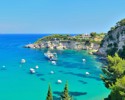
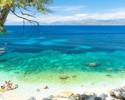

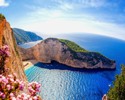
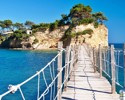
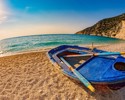
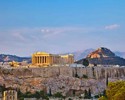
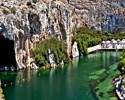
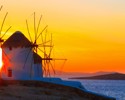
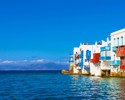
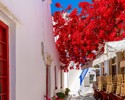
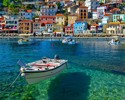
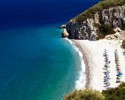
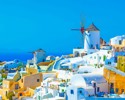
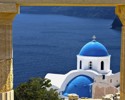
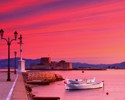
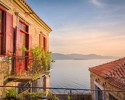

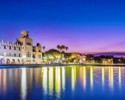
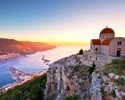
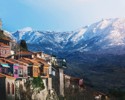

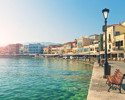


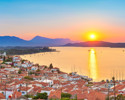

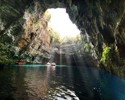
Date last updated:



























